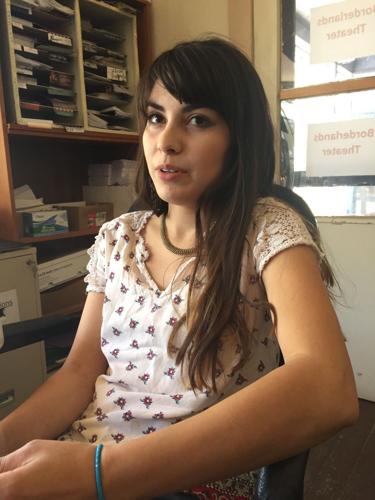Growing up, Perla Vanesa Barraza knew about her legal status in this country. It was not something she had to deal with until one day at high school she sought to enroll in a Pima Community College course.
While filling out the paperwork, she reached the line that asked for legal residency.
“I literally broke down,” said Barraza, who was 3 years old when her parents brought her and a younger sister to the U.S. from Tijuana, Mexico. A second sister was born in the United States.
Barraza made a beeline to a teacher at Desert View High School and revealed something she had never before told a teacher.
“I said it: I’m illegal,” she said, quickly adding, “And I hate that word.”
But that hateful, abusive word doesn’t even come close to defining who Barraza is and what dreams the 24-year-old Tucson resident has.
She’s a daughter and a sister. She’s an avid learner and an aspiring actress. She’s animated and pensive. She’s a “Dreamer” and a recipient of DACA (the Deferred Action for Childhood Arrivals policy), someone who, meeting specific requirements, received a temporary job permit and a stay of deportation.
I caught up with Barraza at the downtown office of Borderlands Theater, where she works part time and is a member of the grass-roots theater ensemble. In the recently concluded Borderlands’ production, “Ghosts of Lote Bravo,” Barraza played the challenging role of Raquel, a teenager caught in a vise of poverty and violence in a Mexican border city.
Hers was an emotionally draining role, one that she relished.
Theater, she said, allows her to channel her energy and focus, diverting the emotions and worries. Theater, she added, is her safe haven.
Like the tens of thousands of others who are working, studying and dreaming under the 2012 provisions of DACA, Barraza is waiting for a critical U.S. Supreme Court decision. The court will decide whether to uphold President Obama’s executive orders that granted temporary reprieve to a fraction of undocumented immigrants under DACA, along with the policy’s expanded version in 2014 and that year’s Deferred Action for Parents of Americans (DAPA), which granted temporary status to parents of U.S. citizens or residents.
Last month, an ideologically divided high court heard arguments in support of the administration and from 26 states, including Arizona, opposing the regulations. The court is expected to make a ruling this summer, as early as June. The law might be upheld, struck down or left alone for the next president after the November election.
Regardless, Barraza said her life will remain unchanged. She will pursue acting and worry about her mother, who is undocumented and remains unprotected from deportation. Barraza’s father lives in Nogales, Sonora, after he was deported in October.
“We do the fence thing,” she said, referring to how she and her father visit, fingers touching fingers, separated by the border barrier.
At home, Barraza lives with her mother on Tucson’s south side.
“My mom struggles every day,” Barraza said.
Some days her mother makes money cleaning houses. Other days she doesn’t.
“I don’t know how she does it every day,” Barraza says.
In addition to her Borderlands’ work, Barraza works two days a week as a tutor in Sells on the Tohono O’odham Nation. She also continues to complete her associate’s degree at Pima, with the goal of transferring to a university to study theater.
But, again, her legal status will determine if she can attend or even afford a university. Arizona’s public universities charge DACA students in-state tuition, which is still steep for Barraza and other working-class Dreamers.
Barraza, who had a near-perfect GPA in high school, could have received a Pima College scholarship, but was ineligible because of her legal status. Still, she cobbled together several scholarships afforded to DACA students. She has worked with Scholarships A-Z, a state group that supports DACA students with resources and information, and organizes workshops for students and educators.
It’s a struggle, she said, living under political uncertainties, and constantly facing risks and rejection from a sizable portion of the public.
“It’s depressing. It’s like living in a cage,” she said. “You’re trying to feed yourself, but some people don’t want you to eat.”
Barraza will persevere. She intends to find her life’s sustenance performing on the stage.
She said: “I can use theater as a form of activism.”





